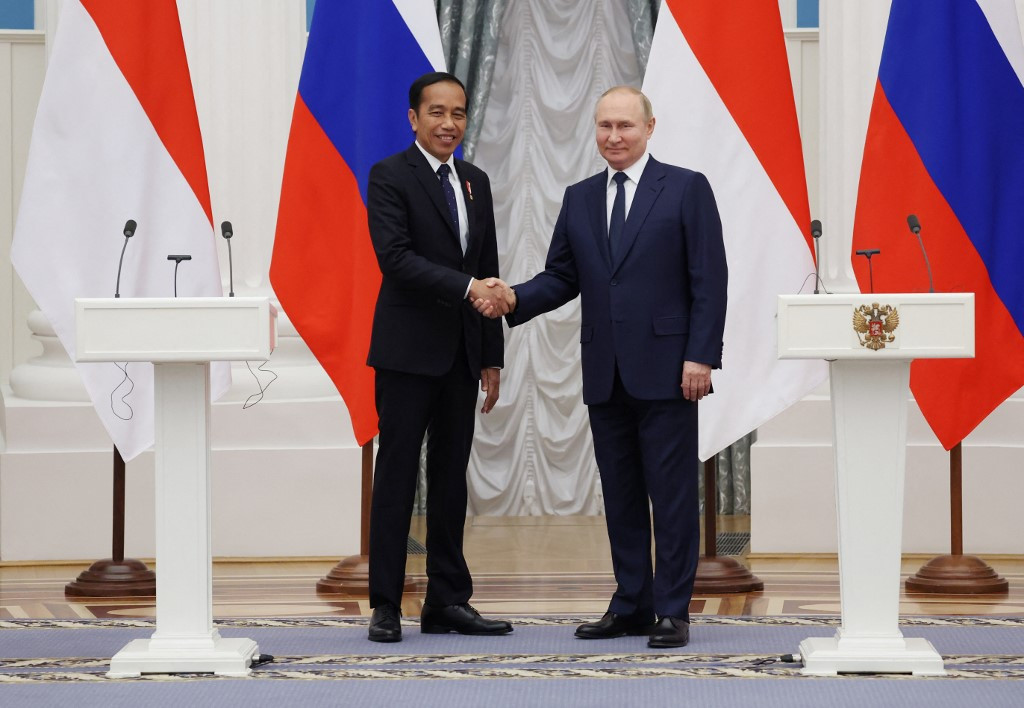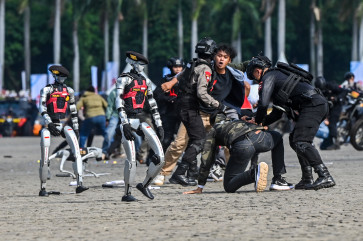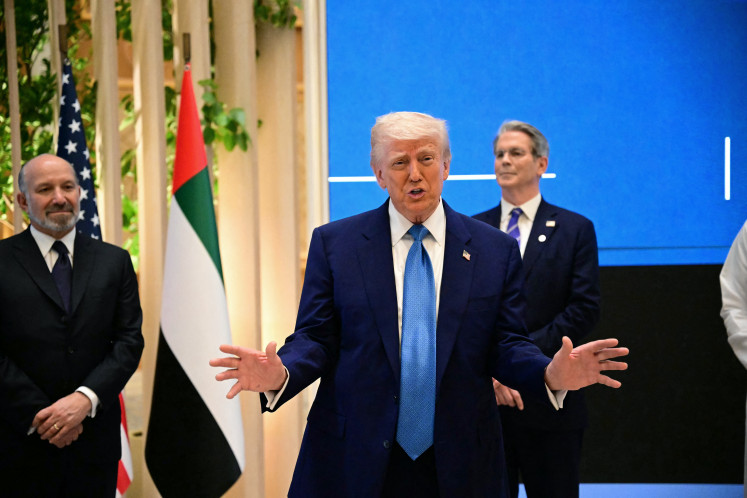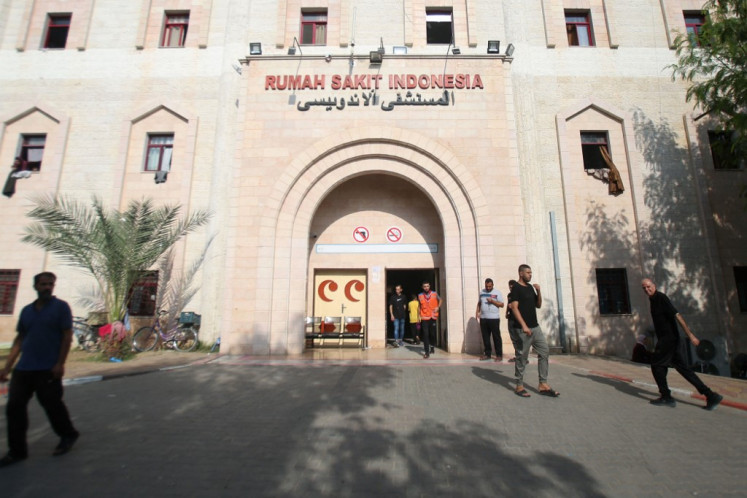Popular Reads
Top Results
Can't find what you're looking for?
View all search resultsPopular Reads
Top Results
Can't find what you're looking for?
View all search resultsMillions of lives at stake if G20 fails to act: Jokowi
The current chair of the G20 also called on the forum's finance ministers — who are scheduled to meet later this week in Bali — to work out a solution that could help ease access to food for millions who are currently facing a shortage of grain and cereals because of the war in Ukraine.
Change text size
Gift Premium Articles
to Anyone

President Joko "Jokowi" Widodo urged countries of the Group of 20 to set aside their differences and continue working toward a peaceful solution to the war in Ukraine, as the lives of billions could be on the line if the conflict persisted and disrupted the supply of basic foodstuffs.
He also called on the forum's finance ministers — who are scheduled to meet later this week in Bali — to work out a solution that could help ease access to food for millions who are currently facing a shortage of grain and cereals as a result of Russia's ongoing invasion of the European country.
"The lives of millions if not billions of people, mostly in Africa and Asia, could be at stake if these grains are not released," Jokowi told journalists at the State Palace on Wednesday.
He was referring to an estimated of 50 million metric tons of new grain harvests now stuck in Ukraine because of a Russian blockade.
"Imagine how many lives could be saved with that amount of grain," said the current chair of the G20.
The President added that although Indonesia — a major consumer of rice — had not been seriously impacted by the grain shortage, a disruption in the supply of gas could spell more trouble in the near future.
"If we don't get a sufficient supply of gas, we can't produce fertilizers for farmers to use in rice cultivation, so rice production could also be impacted," he said.
In his trip to Moscow in early July, President Jokowi secured a commitment from Russian President Vladimir Putin to guarantee shipments of food and fertilizer from both Russia and Ukraine.
In his meeting with Group of Seven leaders prior to his visit to Kyiv and Moscow, Jokowi also urged leaders to ensure that sanctions on Russia would not affect such supplies.
The war in Ukraine has caused major disruptions to global trade, with the prices of grain and wheat soaring amid a blockade of Ukrainian seaports and sanctions on Russian commodities such as oil, gas and fertilizer.
The foreign ministers' meeting in Bali last week failed to produce an agreement that could break the deadlock between Russia and the West, with some sessions turning into a shouting match that culminated with Russian Foreign Minister Sergei Lavrov walking out of the room.
Lavrov dismissed what he cast as the West's "frenzied" criticism of the war in Ukraine at a G20 meeting, scolding Russia's rivals for scuppering a chance to tackle global economic issues.
At the meeting, which put some of the staunchest critics of Russia's invasion in the same room as Moscow's top diplomat, host Indonesia urged G20 members to help end the war.
"Aggressors, invaders, occupiers — we heard a lot of things today," Lavrov told reporters.
On Wednesday, government sources in Germany said the country was expecting more open and direct discussions with Russia at the upcoming meeting of G20 finance ministers, after a G20 meeting in Washington in April was also disrupted by walkouts.
"Most will want to adopt a different approach on the day after April," one of the sources added, referring to a walkout staged by top officials from Britain, the United States and Canada.
Efforts by Indonesia — which is hosting the meeting in Bali on Friday and Saturday —to reach an agreement on a joint communique will be very difficult, the source said, adding that Russia and China were banding together more closely amid a crisis with the West over Moscow's war in Ukraine, Reuters reported.
Meanwhile, Bank Indonesia (BI) warned on Wednesday that the absence of a proper exit policy could prolong the war instead of solving it and urged countries to come up with an optimal mix so they could have a soft landing in the wake of the crisis.
Solikin M. Juhro, who heads BI'sEconomic and Monetary Policy Department, said on Wednesday that the world now faced prolonged and contagious crises with shorter intervals between each of them.
An exit policy made after each crisis had the potential to create further vulnerabilities, but countries could prevent them as long as they could manage to properly formulate their strategy, he added.
“So, if you cannot manage this properly, there will be risks of another crisis,” Solikin said in a seminar held in the lead-up to the G20 Finance Ministers' Meeting in Bali.
After two years of pandemic restrictions, the world economy had just started etching a path toward recovery when it was hit by rising inflation, followed by supply-chain disruptions induced by the Ukraine war on top of producers' inability to meet the rapidly surging demand.
Authorities around the world were pushed on a course of unprecedented monetary tightening that could threaten recovery in many parts of the world, with some at risk of facing another recession.
BI Institute head Yoga Affandi said on Wednesday that a proper policy mix could be achieved by successfully managing the stability of the monetary, exchange rate and financial systems.
Based on past experiences, Yoga pointed to the importance of ensuring exchange rate stability first by having its movement under control, arguing it would help the central bank mitigate against volatility and maintain external stability.
He said having a stable exchange rate would allow central banks to ensure the consistency of inflation targets while securing external stability to help reduce any possible excessive volatility that may put pressure on financial stability.
“So, we need to enhance the central bank policy mix to ensure exchange rate stability,” he said.
---
Correction
The second paragraph of the previous version of this article included a mistake.
It was supposed to read: "He also called on the forum's finance ministers — who are scheduled to meet later this week in Bali — to work out a solution that could help ease access to food for millions who are currently facing a shortage of grain and cereals as a result of Russia's ongoing invasion of the European country."
We apologize for the error.
- Editor










